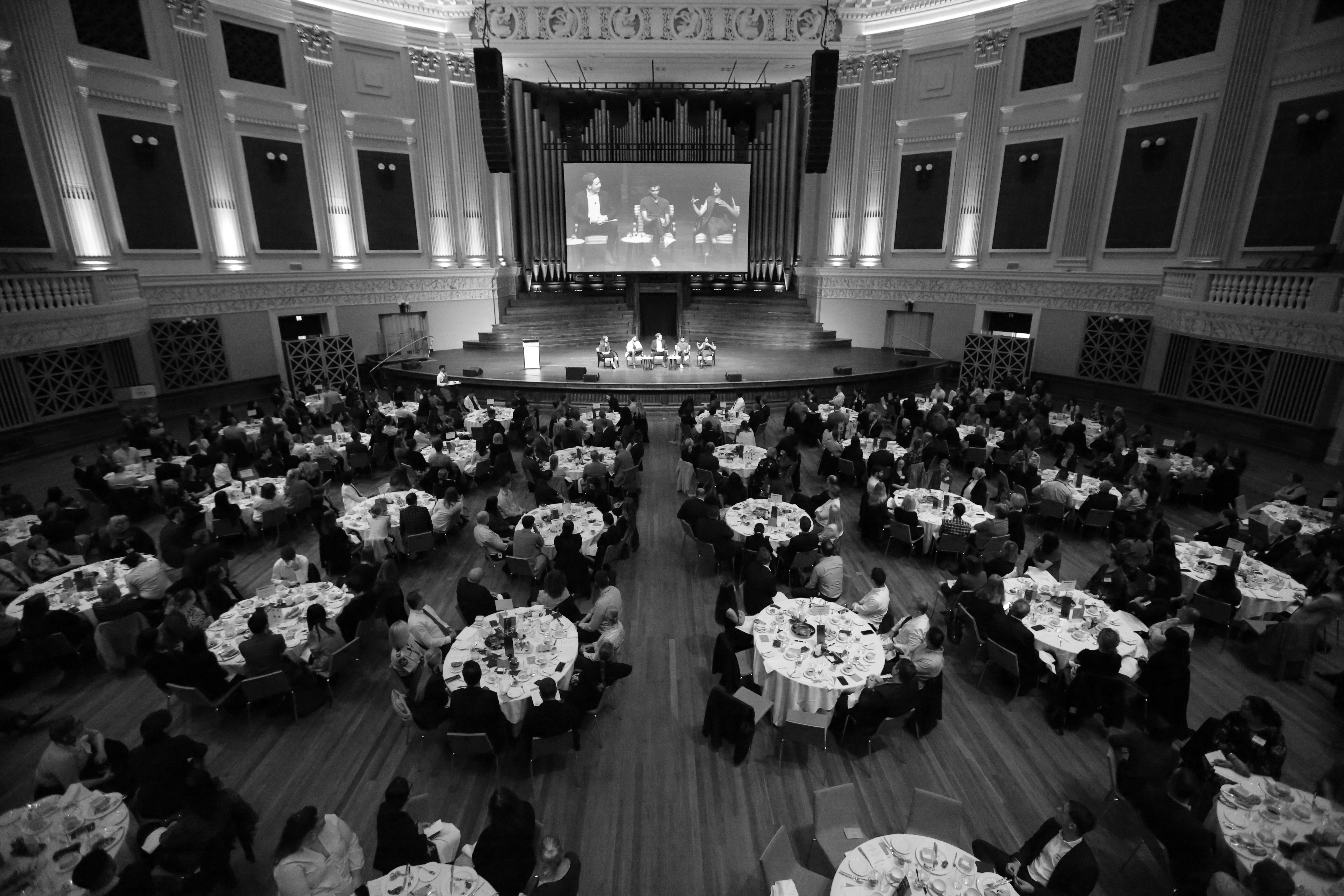2021 CEO & YP BREAKFAST TAKEAWAYS
IPAA Queensland was proud to host its fourth annual Chief Executives and Young Professionals Breakfast at Brisbane City Hall on Thursday, 20 May. Delivered in partnership with our sponsors KPMG and QSuper, chief executives and senior leaders from government, professional services firms and universities hosted tables with their young and emerging leaders.
With a theme of Creating change: Purpose, ethics, impact, four outstanding young social entrepreneurs (aka change makers!) shared their personal stories of finding their purpose and passion to make the world a better place.
Featuring Camille Socquet-Clerc (founder of Bloom Impact Investing), Will Smith-Stubbs (co-founder of spur: and spur:org), Sabrina Chakori (founder of the Brisbane Tool Library) and Taj Pabari (founder and CEO of the Australian School of Entrepreneurship, ASE), each spoke briefly about their journey and the insights and lessons they had learned along the way before joining in an engaging panel discussion and audience Q&A.
A program designed to inform, challenge thinking and inspire those working in public purpose.
Their stories encompassed financial investing to save the planet, a deeply personal story of tackling mental health and wellbeing of young people, libraries for sharing and reusing all kinds of things in support of a circular economy, and programs to foster the imagination and entrepreneurial skills of young people for a future world.
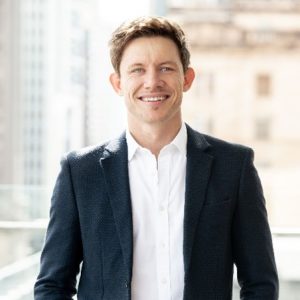
MC and Moderator for the event, Tom Allen, CEO of Impact Boom ensured a lively, quick-paced, and compelling discussion that also provided opportunities for attendees to engage in discussions at their tables as well as with the speakers.
A program designed to inform, challenge thinking and inspire those working in public purpose – whether as public servants or those from other sectors such as not-for-profit and social enterprise, professional services firms and universities. The program highlighted the rich diversity of individuals, organisations and sectors that are tackling some of our most pressing public policy challenges and making positive change for clients and communities. A terrific reminder that ‘we’re all in this together’!
We share some takeaways on finding and pursuing your purpose and some excerpts below. Watch out for further content in upcoming issues!
Be curious, follow that issue that’s always niggling in your thoughts. Perhaps that’s where your passion lies.
Be the change you want to see in the world.
Starting the journey is about taking that first step on the first day and then the next day, and …
Don’t get caught up with being superhuman. Be humble, and say ‘I don’t know’.
Learn to manage your energy, not your time.
Foster relationships and human connections, build a community around your purpose.
Don’t ask “WHAT do you want to be when you grow up”, ask “ WHO do you want to be when you grow up?”
Camille’s journey
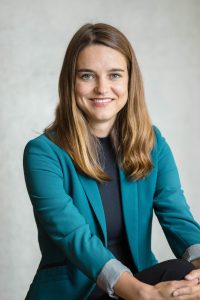
If not me, then who? If not now, when?
After 10 years working in digital marketing managing multi-million e-commerce websites my life and my career path changed one morning of 2018, when I read a story about the United Nation Intergovernmental Panel on Climate Change report that essentially told us that we had 10 years left to solve climate change and limit global warming to 1.5 degree warming. At this time I also learned about climate tipping points, the concept that if the world went over a two degrees warming, there would be no turning back. A new concept entered my consciousness. I was going to see, possibly in my lifetime, the window to solve climate change maybe close once and for all! I had to do something. I had to dedicate my life to solving climate change. I was healthy. I was young. I was living in one of the wealthiest countries on earth, Australia. If not me, then who? If not now, when?
I then joined the leading CleanTech Accelerator in Australia called Energy Lab and I learned something incredible – that we had all the technologies we needed to solve climate change and on top of this, I learned about how exciting the clean energy transition was.
I noticed that the Australian CleanTech Index has been outperforming the ASX 200 for seven years in a row. So I started to think, hang on a minute. Maybe I too should invest my own money into things I believe in if they are also making money. Well little did I know that it was so complicated! Even though I knew a lot about CleanTech and I really wanted to put my money towards things I believed in, it was really hard. Most of the funds were restricted to wealthy sophisticated investors. This is how bloom was born – to make climate impact investing easy and accessible.
We want to empower millions of people to grow their wealth while solving climate change. There are close to 450 young people in this room. Quick back of the envelope calculation – let’s say we all we all have around $30,000 in our superannuation accounts. That means this morning we have $13.5 million available, $13.5 million we can use for good.
I want to leave you with one message today. You can be the change you want to see in the world. The clean energy transition is already underway. But will we go fast enough to solve climate change? Will you be part of it? You can use your money power for good!
William Smith-Stubbs
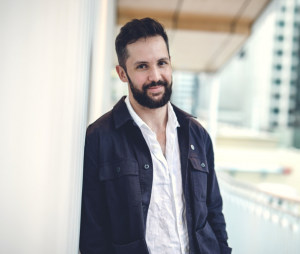
Once you’re through a crisis, the best thing you can do is to look at how you can help somebody else in their crisis.
At the end of today, 9 Australians will have lost their life to suicide. That is a heartbreaking reality that will happen again tomorrow, the day after that, until by the end of the year there will be thousands of Australians who have decided it was an easier option to take their own life than to seek help. Most of those, 75% or more, will be men, young men in particular.
For me, this is something that’s particularly personal. I was in that situation. I got very sick and spent most of a year in bed … I thought the best thing I could do would be to take my own life. It was through a very scant chance that I didn’t lose my life. The crisis I was going through … I didn’t want to think about it for many years after seeking help and receiving treatment and I didn’t talk to many people about it … but it became a catalyst. Many years later in my early 20s, I met a couple of other young guys here in Brisbane. We’d read some of the statistics about young male suicide in Australia and we thought “well how hard could that be to fix?” Turns out, it’s pretty hard but we decide to give it a good crack. A lot of the material, the communications about mental health aimed at young men was a black and white pamphlet with depression across the top and a man sitting on the edge of his bed with his head in his hands. Not at all what I had wanted to read.
So instead we created a campaign, our very first crack at public health campaigning and behavior change and, quite cheekily it was called “Soften the f#@* up”. It was based on the notion that as young men, we were told to harden the f#@* up, to toughen the f#@* up. That teaches us not to seek help when we need to.
Our campaign was arguably very successful. We received a number of awards and got covered in national and international news. A channel 10 newscaster live on air revealed at the time that he had been suicidal, which was unheard of at the time. It meant a lot to me that I could use that experience of mine to help other people.
It also taught us a lot about what was wrong with our campaign. Except for a few anecdotes of people that had left comments online, or got in touch with us, or had spoken of events like this, we had very little way of measuring the outcome. Had we shifted that needle? Had we stopped nine and made it eight that year? There was no way for us to know but that generated for us an obsession with social change and changing behaviors understanding what drives people to make the decisions that they make and how we influence those for the better.
In 2011 we created a non-profit; we formed spur: projects and the idea was – “let’s just tackle hard complex things, everything from youth male suicide to elder suicide” which we did. One of the lessons Will shared – the best thing you can do with a crisis once you’re through it, is to look at how you can help somebody else in their crisis. If you’ve come out of that dark wood, how do you help somebody else emerge from it themselves? That’s what I did with my crisis. I found it as a purpose.
SABRINA
I didn’t start out of passion, I started out of responsibility.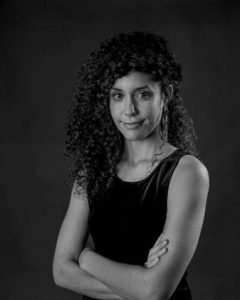
I would like to start by asking this question – “How can we create an unsustainable society?” [What would that take?]
- Depleting natural resources? Tick.
- Increasing the risk of pandemic? On track.
- Widening inequality? Tick.
- Polluting air and water? Tick.
So unfortunately we’re pretty much on track for components of an unsustainable society.
I was born in 1992, the year of the first climate summit in Rio de Janeiro. I’m the generation that inherited a sick planet. Where and how can I start making positive change is a question that I’ve carried with me all my life. Since 14, I joined various campaigns. I led and started projects from the protection of the Amazon Forest to the reduction of plastic pollution to the fight for free education to the fight for Aboriginal rights and more. I’ve been involved across Europe, Mexico, Kenya, Ecuador and here in Australia.
In my 20s, I began to understand that the current hungry growth-driven system is at the root of the interlinked social and ecological crisis that we are facing today. This led me in 2017 to start the Brisbane Tool Library. This was my response to shift away from the productivist and consumerist economy. I didn’t start out of passion, I started out of responsibility.
The Brisbane Tool Library really works like a book library but instead, people can borrow hand and power tools, camping gear, kitchen and party appliances and much more. We rescue items from the community or through donation of businesses. We also rescue them from the Brisbane City Council recovery center. When the items arrive at the library, we clean them and sometimes that’s enough to reintroduce them in the economy. Sometimes they need more love and safety checks. We then catalog each item so we take a picture, write a description and add them in our inventory line. Our members can borrow any of these things from Christmas decorations to snorkeling gear to power tools and lawn mowers.
By borrowing, our members are building and redesigning the economy. They’re saving money, they’re saving space (in landfills) and they’re reducing their ecological footprint. … We want to empower individuals to make repairs, to have fun, to be creative and to not buy their way out of the system … for a circular economy for the benefit of the community. The key to make this happen was to collaborate and create partnerships.
As an activist, an entrepreneur and an academic, my focus has never been to propose or invent tech solutions. I’ve always been focused on redesigning the social structures. I’m really passionate about recreating the commons, …. it’s about the human relationships … and fostering different ways of valuing and sharing the world around us. Today more than ever because we live in a planet with limited resources, so I invite you to think as a collective and not as individuals.
TAJ
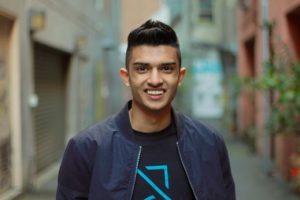
Long story short, we struggled, we failed, but most importantly we learnt a lot.
Mark Twain says there are two significant days in our lives. Number one is the day we’re born and number two is the day we understand why. For me I was lucky. I found my passion from a very young age. Unfortunately for a lot of young people, that’s quite simply not the case.
In school, we’re told to do very well and you’ll get into university; do well in university and you’ll get a good junior job and from a junior job you’ll go to a senior job and the rat race continues. Now there’d be nothing really wrong with that if success in traditional education still correlated to success in the real world. According to a recent OECD study into the relationship between higher education and industry, Australia comes in at 33 out of 33 – last! To me that speaks volumes about the skills mismatch and disconnect between the people who are training our young people and the people who will eventually be employing them.
I was a clinical nerd. When people used to ask me, “Hey Taj, what do you want to do when you grow up?” I used to say technology. I didn’t know why. I didn’t know how. All I knew was that the world of technology made me excited. I struggled through school and by grade six, I picked up three or four suspensions, was on probation, was consistently seeing occupational therapists, speech therapists and according to most of my teachers had clear learning difficulties. Getting any form of engagement out of me in the classroom was impossible.
I was truly inspired by people like Steve Jobs, Mark Zuckerberg and Bill Gates. You could barely get me up at 7am to go to school, but I’d be waking up at 2, 3, 4 o’clock in the morning to watch keynotes from these amazing people when they launched their products that would one day change the world. So one day I thought, all right that sounds kind of cool. Instead of just watching these people, how cool would it be if I could start my own?
So I created a mold of what we called the 56 Tablet Kit at school … a pretty cool concept and the media loved it. My 18 year-old co-founder and I got started working on developing a piece of computer hardware. We sold thousands of units, but unfortunately we had zero experience actually developing a piece of hardware …. Long story short, we struggled, we failed but most importantly we learnt a lot. I was 13 at the time and I’d learned about how to manage a team … basic financial literacy, … how to start a product. We didn’t execute on it, but we started. I formed these incredible life skills, and after two years of making no real visible progress we decided to move on. I then started the Australian School of Entrepreneurship, ASE for short.
We teach young people aged 5 to 24 about how to start their very own micro businesses. Getting young people to actually start micro businesses, to get them off jobseeker or youth allowance. Last year we worked with around 92 000 young people.
We’re supposed to be preparing our young people for jobs in 5, 10, 12 years’ time, but how can we? The innovation economy is completely unpredictable for our young people and probably even more unpredictable for the current workforce as we know it. So what are the human skills of the future that machines will never be able to replicate? We’ll get to these in the panel discussion.
I thought I’d leave you with uh one of my favorite quotes from another former naughty schoolboy [Albert Einstein] who not only managed to connect the dots, but split them too. He says true intelligence is not about knowledge but imagination.
IPAA Queensland members can watch the entire event recording on the members portal.
